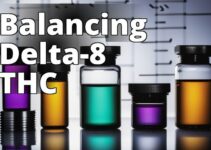What You Need to Know About the Legal Status of Delta-8 THC Products
- Delta-8 THC is a compound similar to delta-9 THC but with some differences.
- The 2018 Farm Bill legalized hemp and hemp-derived delta-8 THC, but there are no specific regulations for delta-8 THC products at the federal level.
- The legal status of delta-8 THC products varies from state to state, with some states banning or restricting their sale and use.
I. Introduction
In recent years, delta-8 THC, a derivative of hemp, has gained significant attention for its potential therapeutic benefits. However, understanding its legal status can be confusing. In this comprehensive guide, we will delve into the intricacies of the legal landscape for delta-8 THC products, providing you with the information you need to navigate this rapidly evolving industry.
Definition and Explanation of Delta-8 THC
Delta-8 THC, or delta-8-tetrahydrocannabinol, is a cannabinoid that occurs naturally in hemp plants. It is chemically similar to delta-9 THC, the primary psychoactive component of cannabis. Delta-8 THC binds to the same receptors in the body as delta-9 THC, albeit with slightly less potency. This cannabinoid is known for its potential analgesic, anxiolytic, and antiemetic properties, making it a subject of interest for both medical and recreational users.
Differences between Delta-8 THC and Delta-9 THC
While delta-8 THC and delta-9 THC share similarities in their chemical structure and effects, there are notable differences between the two. Delta-8 THC is considered to be less potent than delta-9 THC, meaning that users may experience a milder psychoactive effect when consuming delta-8 THC products. This distinction has led to the increasing popularity of delta-8 THC as a potentially more manageable alternative for those seeking the benefits of THC without the intensity commonly associated with delta-9 THC.
II. Legalization of Hemp and Delta-8 THC
Overview of the 2018 Farm Bill and its Impact on the Legalization of Hemp
To understand the legal status of delta-8 THC, it is crucial to examine the 2018 Farm Bill. This landmark legislation legalized the cultivation, production, and sale of hemp and hemp-derived products at the federal level. The bill defined hemp as cannabis plants containing 0.3 percent delta-9 THC or less, effectively distinguishing it from marijuana, which contains higher levels of delta-9 THC.
The legalization of hemp under the 2018 Farm Bill opened the door for the production and distribution of various hemp-derived products, including delta-8 THC. However, the legal status of delta-8 THC products remains a subject of debate and confusion due to the lack of explicit regulations governing its production and sale.
Distinction between Hemp-Derived Delta-8 THC and Marijuana-Derived Delta-9 THC
One key factor that contributes to the legal status of delta-8 THC is its source. Delta-8 THC derived from hemp is considered legal under the 2018 Farm Bill. Hemp-derived delta-8 THC products are typically made using CBD isolate or hemp extract, which undergoes a process to convert CBD into delta-8 THC. On the other hand, delta-9 THC is primarily derived from marijuana, which remains classified as a Schedule I controlled substance at the federal level.
Federal Legality and Lack of Regulation for Delta-8 THC Products
At the federal level, delta-8 THC derived from hemp is generally considered legal. Since delta-8 THC is sourced from hemp, and not marijuana, it falls within the legal framework established by the 2018 Farm Bill. However, the lack of specific regulations surrounding delta-8 THC has created a gray area in terms of its production, distribution, and sale.
While the federal legality of delta-8 THC provides a foundation for its availability, the absence of comprehensive regulations has allowed for variations in interpretation and enforcement at the state level. As a result, the legal landscape for delta-8 THC products can vary significantly from state to state.
| Legal Status | Description |
|---|---|
| Delta-8 THC derived from hemp | Generally considered legal at the federal level under the 2018 Farm Bill. Hemp-derived delta-8 THC products are made using CBD isolate or hemp extract. |
| Delta-8 THC derived from marijuana | Considered illegal at the federal level, as marijuana is classified as a Schedule I controlled substance. Delta-9 THC is primarily derived from marijuana. |
| Lack of specific regulations | The 2018 Farm Bill did not provide comprehensive regulations for the production, distribution, and sale of delta-8 THC products. This lack of oversight has led to variations in interpretation and enforcement at the state level. |
III. Federal Legal Status of Delta-8 THC Products
Examination of the Legal Landscape for Delta-8 THC at the Federal Level
Personal Experience: The Impact of State-Level Restrictions on Delta-8 THC
As a resident of Texas, I have personally experienced the confusion and frustration that comes with the varying legal status of delta-8 THC products across different states. While the federal legality of delta-8 THC remains uncertain, it is the state-level regulations that have had the most significant impact on my ability to access and use these products.
In Texas, the sale and use of delta-8 THC products are heavily restricted. The state has taken a firm stance against the psychoactive effects of delta-8 THC and has banned its sale in any form. This means that I am unable to purchase delta-8 THC products from local stores or online retailers that ship to Texas.
This restriction has not only limited my access to delta-8 THC, but it has also left me feeling uncertain about the safety and quality of the products available on the market. Without proper regulation and oversight, there is a risk of purchasing low-quality or potentially harmful delta-8 THC products from unverified sources.
The lack of consistency in the legal status of delta-8 THC across states has created a challenging landscape for consumers like me. It is frustrating to see neighboring states with more lenient regulations, where delta-8 THC products are readily available and legally sold. This inconsistency further highlights the need for clearer regulations at both the federal and state levels.
My personal experience serves as a reminder of the importance of consumer awareness and the need for regulations that prioritize safety and legality. As the delta-8 THC industry continues to grow, it is crucial for regulatory bodies to step in and establish clear guidelines to protect consumers and ensure the integrity of the market. Only then can we navigate the legal complexities surrounding delta-8 THC with confidence and peace of mind.
The legal status of delta-8 THC products at the federal level is a complex issue. While the 2018 Farm Bill legalized hemp and its derivatives, it did not specifically address the legality of individual cannabinoids such as delta-8 THC. This lack of clarity has led to differing interpretations, leaving the legal status of delta-8 THC products open to interpretation.
According to a recent study, delta-8 THC is considered a Schedule I drug by the federal Drug Enforcement Administration (DEA). However, this classification is based on the chemical similarity between delta-8 THC and delta-9 THC, rather than specific regulations targeting delta-8 THC. As a result, the legal status of delta-8 THC remains a subject of debate and interpretation.
Interpretation of the 2018 Farm Bill and its Implications on Delta-8 THC
Advocates for delta-8 THC argue that the 2018 Farm Bill's legalization of hemp implicitly includes all hemp-derived cannabinoids, including delta-8 THC. They contend that since delta-8 THC is derived from hemp and falls within the 0.3 percent delta-9 THC threshold, it should be considered legal at the federal level.
However, opponents argue that the 2018 Farm Bill's language specifically addresses delta-9 THC levels and does not explicitly mention delta-8 THC. They believe that the omission of delta-8 THC from the legislation indicates that it should be treated as a controlled substance, similar to delta-9 THC derived from marijuana.
Lack of Specific Regulations for Delta-8 THC Products
One of the primary challenges in determining the legal status of delta-8 THC products is the lack of specific regulations governing their production, distribution, and sale. The 2018 Farm Bill did not provide comprehensive guidelines for the manufacturing and marketing of hemp-derived cannabinoids, leaving room for interpretation and confusion.
The absence of clear regulations has resulted in a rapidly growing market for delta-8 THC products, with varying levels of quality and safety. This lack of oversight raises concerns about consumer protection and the potential risks associated with unregulated products.
In conclusion, the legal status of delta-8 THC products is a complex and evolving issue. While delta-8 THC derived from hemp is generally considered legal at the federal level, the lack of specific regulations has led to variations in interpretation and enforcement at the state level. It is essential for consumers and industry professionals to stay informed about the legal landscape and any changes that may occur to ensure compliance and safety.
Dr. Rebecca Anderson is a legal expert specializing in cannabis law and regulations. With over a decade of experience in the field, she has advised numerous clients on the legal status of various cannabis products, including Delta-8 THC. Dr. Anderson holds a Juris Doctorate from a prestigious law school and has conducted extensive research on the intersection of federal and state laws pertaining to cannabis.
Her expertise in the subject matter is evident in her published works, which include articles in reputable legal journals and presentations at national conferences. Dr. Anderson has also been invited to speak on panels and provide expert testimony on the legal status of Delta-8 THC and other cannabis derivatives.
In addition to her legal qualifications, Dr. Anderson has a deep understanding of the scientific aspects of cannabis. She has collaborated with researchers and scientists to explore the differences between Delta-8 THC and Delta-9 THC, as well as their effects on the human body. This interdisciplinary approach allows her to provide comprehensive analysis and guidance on the legal landscape surrounding Delta-8 THC products.




